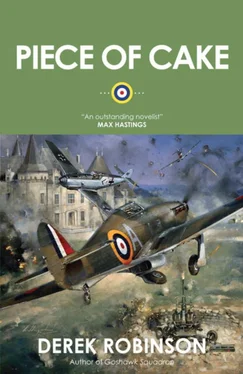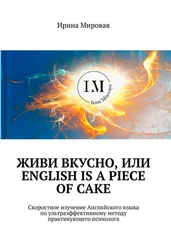“This is a most extraordinary war, Fitz,” Cox said. He was in full flying kit and carrying his parachute. “I managed to glide back and I put her down on a cricket pitch near Eastbourne. Big expensive boys’ school, lovely bit of grass, perfect three-pointer, not a scratch. Got out, nobody there. Place was deserted. Not a soul. School holidays, see. So I sniffed around, found a bike, kind of thing the butcher’s boy rides, stuffed the parachute in the basket, stooged off. Rode down the hill, guess what: lovely big railway station. Only trouble is, the stupid bloody ticket inspector won’t let me on the platform. No ticket, see. No money, of course, so nothing doing. Utter deadlock.”
“You should’ve clocked him one,” Fitz said.
“Six foot four, chum. Anyway, I explained everything to him but I don’t think he believed it. Thought it was a practical joke. Took a very dim view of me, actually.”
“Bloody fool.”
“Yes, that’s what I told him, but he still didn’t agree, so I toddled off and found a pawn shop.”
“Hey, that’s clever.”
“Thanks. Well, they weren’t too keen, they didn’t want my watch, it’s got ‘RAF property’ engraved on the back, so I offered them the parachute but they turned up their noses at that too, and in the end I popped the bicycle.”
“Good show. What did you get for it?”
“A quid.”
“That’s not much.”
“Well, it wasn’t my bike, was it?”
“Look here, you two,” Kellaway said. “You’d better get cracking.”
“You know, they ought to give us travel vouchers,” Fitz said. “In case we get forced down.”
“They ought to give us lots of things,” Cox said. “Starting with back-pay.”
“I’m doing my best,” Kellaway told him. “You’ll get it eventually.”
Cox grunted. “Flip didn’t,” he said. Kellaway wisely let that pass.
They went off, got changed into their best blue, and reported to the station chapel. All the stained-glass windows had been blown in by the bombing, and bright sunlight lit up the flag that covered the coffin. A young airman was playing Bach on the organ.
“All right, this is the form,” Cox told his flight softly. “We carry the doings out. Three a side. Me, Zab and Pip on the left, the others on the right. Drive to the cemetery, it’s just around the corner, take the doings to the hole, the adj knows where, we follow him. Short service, back here. Okay? Oh… One little thing. There wasn’t very much left, so they’ve put a few sandbags in the box to help sort of pack it out. If you hear things sliding about when we pick it up, don’t worry.”
“So we’re doing all this just to bury a bit of Southend Sands,” Patterson said wearily. “What a pathetic joke.”
“It’s the thought that counts,” Gordon observed.
“Well, I think it stinks.”
Gordon sniffed like a rabbit. “No, you’re wrong there,” he said. “That’s Quirk’s Brylcreem. Totally different pong.”
“Hello hello,” Zabarnowski said. “There are guests. Relatives, maybe?”
The adjutant had arrived with a middleaged civilian couple, evidently man and wife. Cox went over. “This is Mr. and Mrs. Burnett,” Kellaway said. “Next-of-kin. Flight Lieutenant Cox.” They shook hands. The man was wearing a blue suit and carrying a bowler hat; his wife’s face was almost invisible behind a gray veil. “Very kind of you to come all this way,” Cox said.
“Only London,” Burnett said. “No distance, really, on the train.” His face was tanned as far as the line of his hat and baby-white above. His grip was hard. There was still plenty of Ulster in his voice.
“Our last chance to pay our respects,” Mrs. Burnett said. Her accent churned the syllables like butter. “Poor dear Maurice,” she said. “A lovely boy.”
Cox was startled. Maurice? It seemed an unsuitable name. Maurice. Good God. Fancy old Flip…
Burnett was speaking. “I hope we got here in time,” he was saying. “So we can have one last glimpse of the dear man before… you know…”
“Ah… well…” Cox glanced sharply at the adjutant.
“It would give Maurice’s poor mother such tremendous comfort, I know it would,” Mrs. Burnett said, “if we could tell her we were the last to set eyes on her Maurice, us being his own flesh and blood too, d’ye see.”
“Oh dear,” Kellaway said. “What a shame. What a very great pity. I’m afraid it’s too late for that now. I am sorry.”
“’twould only take a couple of minutes,” she said. “His poor dear mother in Ballymena…”
“I’m awfully sorry,” Cox said, “but you see the coffin has been… um… sealed.”
“Scaled, is it?” Burnett said. “Would that mean they’ve screwed the lid on?”
“It would. I mean, yes, they have.”
“Ah, well, that’s no great problem, is it?” He took a short screwdriver from his pocket. “There would be no disrespect, would there? Half a tick, that’s all it would take.”
“Look: I’m afraid a screwdriver won’t do,” Cox said. “It’s just not on, I’m afraid.”
Burnett looked at him, not understanding.
“Take care of this lady for a moment,” the adjutant told Cox. He took Burnett outside. “If you insist,” he said, “I’ll have the coffin opened, but believe me you won’t recognize anything you see and your wife will be very upset.”
It took a moment for Burnett to realize what this meant. “Maurice wasn’t just… you know… killed, then?” He didn’t want to look at Kellaway. He brushed dust from his bowler hat with his thick, strong fingers. He was accustomed to death and corpses, funerals and wakes; they were an important part of family life, a necessary and satisfying ritual. But this was different, horribly different. This was more than death. This was something so ugly and agonizing that it had to be shut away. This was pain and suffering so severe that it could hurt others, even after the body had died. This had the makings of a nightmare. “We thought… I suppose we thought… maybe a bullet or something…”
“Flight Lieutenant Moran was shot down in flames,” Kellaway said. “He was burned to death.” There, you stupid civilian , he thought, you asked for it, now you’ve got it, so can we please get on with the job? Thank you .
Burnett had to take a digestive tablet before he could go inside. He said nothing to his wife; simply shook his head. The funeral went off all right. Cox noticed that the chaplain said Mo ran instead of Moran . It made Flip sound like an idiot.
They changed from best blue back to flying kit and landed at Bodkin Hazel at four o’clock, just in time for tea, except that Jerry didn’t believe in tea. The first cups were being filled when the squadron got scrambled.
Sometimes the Luftwaffe made cock-ups too.
Thirty Heinkel 111’s were three miles ahead, circling the Isle of Sheppey at fourteen thousand. Barton leveled out at sixteen thousand—fourteen for the controller and two for luck—and called the tally-ho. With the sun on his left and the sky bright and empty, he had a huge view; and what he could see, in addition to the Essex flatlands and all the Thames estuary, and half of Kent, was that Jerry had cocked it up. These slow Heinkels had gone on ahead expecting to rendezvous with their escort, and now they were having to stooge about and wait for the escort to turn up. In fact he could see the escort belting along the north Kent coast: twenty or so Messerschmitt 110’s. No doubt the kraut R/T was crackling with bad temper.
The 110’s started to climb as soon as they saw the Hurricanes, and the Heinkels came out of their orbit and headed west.
“Mango Leader to Blue Leader,” Barton called. “Your flight can handle those fighters. Better go now.”
Читать дальше












